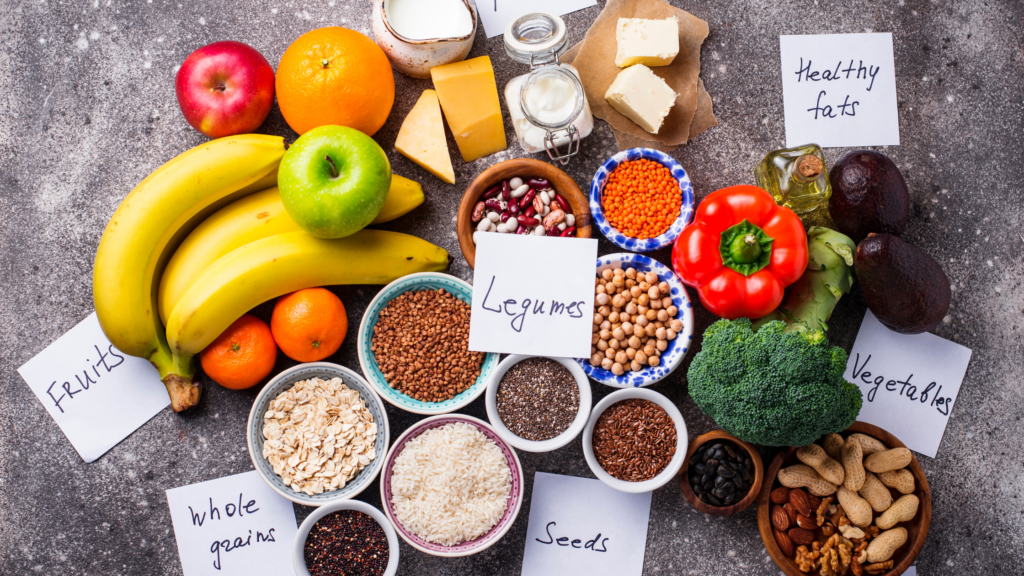So, you’ve decided that you’d like to go plant-based? But where do you start? Transitioning to a plant-based lifestyle can seem really daunting at first, and it certainly is a big lifestyle change, but through the help of the team here at JCN- we can help you make this change with a lot more ease.
First off, what actually is a plant-based diet?
There are a few different kinds, but most will fit into one of the categories below:
Lacto-vegetarian diets exclude meat, fish, poultry, and eggs, as well as foods that contain them. Dairy products, such as milk, cheese, yogurt, and butter, are included.
Ovo-vegetarian diets exclude meat, poultry, seafood, and dairy products, but allow eggs.
Lacto-ovo vegetarian diets exclude meat, fish, and poultry, but allow dairy products and eggs.
Pescatarian diets exclude meat and poultry, dairy, and eggs, but allow fish.
Vegan diets exclude meat, poultry, fish, eggs, dairy products, and any animal derived products— and foods that contain these products.
As with any lifestyle change and goal- knowing your WHY is important to making a start on your journey. Find your own personal reasons for being vegan, there’s loads of them. Common reasons for going plant-based include religion, ethical, environmental, diet, medical, or just out of interest. Whatever the case- there is no “right reason” – only the reason that works best for you. Whatever plant-based lifestyle you’re looking to adopt- it’s important to go at your own pace and to decide on an approach that best works for you.
Here are some tips to help you get started:
• If you choose to take it slowly, start with the easiest items to eliminate first. For some it might be meat, for others it’s milk. Maybe switch out cow’s milk in your coffee for a nut milk instead.
• Learn the benefits of a plant-based lifestyle and educate yourself about the practices behind the production of plant-based foods.
• Learn how to nourish your body on a plant-based diet using the three main macros (carbohydrates, proteins, and fats). It is important you still find a good balance and intake of each.
• Go easy on the cruciferous veggies to start with. Veggies are an important part of any diet, but during your transition period, we are often consuming a lot more fiber than our bodies are used to, and this may cause some bloating.
• Don’t expect to create meals that will taste like meat or compare them to a meat-based meal – look at this as a new meal, new recipe, with a different taste and combination of foods to decide if it’s something you enjoy.
• Just reducing or eliminating animal products does not automatically mean a plant-based diet is healthy. It is also vital to reduce processed foods. Some replacement meats like vegan sausages and patties, etc. are highly processed and less nutritious.
• Start reading ingredients lists. Quite often you will read an ingredient list and find several animal-derived items you would have never expected to be in there.
• Learn your local providers and sources of plant-based foods. These are becoming more common as plant-based lifestyles have grown in recent times. Be on the lookout for vegan products at your grocery stores and vegan-friendly food chains OR restaurants.
• Keep informed as you go. There is a lot of misinformation pertaining to plant-based do’s and don’ts, so make sure to watch, read and listen to verified documentaries, books, blogs, and people. They can offer valuable insight into plant-based lifestyles, which will certainly help you be more confident in your transition.
Have you ever wondered what you might be missing from a plant-based diet?
We recommend getting an annual check-up to measure levels of essential vitamins and minerals (check iron, B12, and Calcium). If you get this done, please pass on your results to us for future reference.
Iron is important to help our red blood cells carry oxygen to our lungs and around the body so we can move and feel energized. Be sure to keep up with your vitamin c intake to help with the absorption of iron from plant-based sources. You can get this by squeezing lemon on your salad as a dressing and choosing citrus fruits to snack on.
B12 is important to help your body form those red blood cells. You can increase this by taking a B Vitamin complex tablet, or just by adding a Berocca tab to your morning glass of water.
Calcium is important for strong bones. Almost all our calcium is stored in our bones and teeth where it supports their structure and hardness. The body also needs calcium for muscles to move. To make sure you’re getting enough, we suggest drinking 250ml of fortified nut milk per day and choosing a variety of dark green leafy veggies with your main meals.
Omega-3 fatty acids are important for many health reasons including prevention of inflammation in the body and reducing the risks of cardiovascular-related diseases. 2000-3000mg of algae-based omega 3’s capsules are recommended per day on a plant-based lifestyle.
Protein – It’s definitely possible to get all your protein requirements from a plant-based lifestyle, they key is understanding how. Amino acids form the building blocks of proteins that make up 75% of the body. They are involved in almost every biological function, including growth and development, healing and repair, normal digestion, and providing energy for your body. The proteins in your body are made up of combinations of different amino acids. Some our body can make itself (non-essential amino acids), and the rest we need to get from food or supplements (essential amino acids). Meat, dairy, fish, eggs, and soybeans (tofu, tempeh, edamame) all provide each essential amino acid, making them complete proteins. For a vegan or vegetarian diet, we sometimes need to pair certain foods to get the complete profile.
For example:
• beans with corn tortillas
• lentils with rice
• peanut butter on wholegrain toast
These options are still lower in protein than the animal options so sometimes it’s required to supplement with protein powders and/or EAAs to meet our daily protein requirements.
Whether you go vegetarian, full-vegan, or simply cut down your consumption of animal products, don’t allow yourself to become overwhelmed during the transition phase. Adopting a plant-based lifestyle isn’t necessarily difficult, but it will be a learning curve. Take your time, expect some mistakes, learn from them, and move on!

